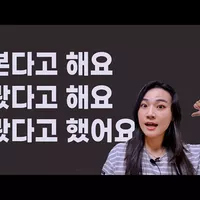(89) 간접 화법 시제 indirect speech a tense - YouTube
(89) indirect speech a tense indirect speech a tense - YouTube
(89) discours indirect a temps discours indirect a temps - YouTube
안녕하세요 그냥 한국어 지은 입니다
Hello, I'm JiEun in just Korean
이번 영상에서는 지난 영상에 이어서
In this video, following the previous video,
간접 화법을 조금 더 볼 건데요
we will see a little more indirect speech.
시제를 볼 거예요
We will look at the tense.
이 시제 부분은 조금 헷갈리니까
This tense part is a little confusing,
집중해서 들어주세요
so please pay attention
먼저 시제를 보기 전에 간접 화법 문장을 한번 다시 볼까요
First, let's look at the indirect speech sentence again before looking at the tense.
예를 들어서 먹는다고 해요
For example, '먹는다고 해요(someone told she eat)'
이 문장을 보면 두 가지 동사가 나와요
There are two verbs
어떤 부분이 있어요
in this sentence.
'먹다, 먹었다' 이 부분이 있고 '해요' 도 동사죠
there is '먹다' this part, and '해요' is also a verb.
사실 '해요'이 부분이 있어요
Actually, there is this part of '해요'
이 두 가지가 동사라서
Since these two are verbs,
이 두 가지 다
both of them can form
시제를 만들 수가 있겠죠
a tense.
그래서 어느 부분에 어떤 시제가 있는지에 따라
So, depending on which part there is a certain tense,
말하는 시간, 행동 한 시간이 달라요
the time you speak and the time you act will be different.
그러면 일단 간단하게 제가 먼저 설명드릴게요
Let me explain briefly
먼저 '해요' 부분 말하는 시간이에요
First of all, it's time to say the '해요' part.
이야기를 하는, 말을 하는 시간
Time about saying
그래서 이 '해요' 가 과거면 과거에 말했고
이 '해요'가 현재면 현재에 말하고
이 '해요'가 미래면 미래에 말할 거라는 뜻이에요
In the future tense, it means that it will be said in the future
그리고 이 앞에 있는 동사 부분은 행동을 하는 시간이요
And the verb part before this is the time during which the action is carried out
그래서 예를 들어서 '먹다'
So, for example, if the past tense of '먹다(먹었다고)' is used,
과거형이면 과거에 먹는 행동을 했다는 뜻이고요
it means that he has eaten in the past.
'먹다'가 현재면 현재 먹는다는 뜻이고요
If '먹다(먹는다고)' is present, it means to eat in the present.
이 '먹다'가 미래면 미래의 먹을 것이다 라는 뜻이에요
If this '먹다(먹을거라고)' is the future, it means that the future will eat.
이게 최대한 제가 간단하게 설명 드린 거예요
This is what I explained as simply as possible.
다시 정리하면 하다 '해요' 이 부분은 말하는 시간
To summarize again, do '하다(해요) This part
앞 동사 부분은 행동을 하는 시간
이렇게예요 아시겠죠?
그러면 예시 문장 제가 세 가지를 드릴게요
어떤 뜻인지 같이 잘 생각을 해볼게요
친구가 영화 보러 간다고 했어요
친구가 영화 보러 갔다고 해요
친구가 영화 보러 갔다고 했어요
이 세 가지 문장비슷하지만
각각의 동사 부분 시제를 바꿨죠 그렇죠?
보통 과거형 을 많이 쓰기 때문에
일단 예시에서는 과거형을 가지고 왔어요
이게 이해가 되시면
다른 시제는 똑같이 적용하시면 되기 때문에
이 세 가지 먼저 이해해보도록 할게요
먼저 첫번째 친구가 영화 보러 간다고 했어요
'간다고' 현재죠? '했어요' 과거죠?
그러면 이 '간다고' 는 사실 현재도 되고 미래도 돼요
그러면 '했어요' 가 과거니까 언제 말해요?
과거에 말해요. 예를 들어서 어제 라고 할게요
어제 말 했어요
어제 말했는데 어제 간다고 해요
그럼 어제 영화 보러 가는 중이거나
어제 저녁 쯤에 갈 거라고 말을 한 거예요
이해가 되셨어요?
그런 말을 어제 했고
행동은 그 순간의 현재로 말을 한 거예요
말을 어제 했으니까
사실 지금으로 보면 행동도 과거 기는 하죠
하지만 그 당시에 현재예요 그 당시에 현재~ 이해되셨어요?
그러면 두 번째 볼게요
친구가 영화를 보러 갔다고 해요
'해요' 뭐예요? 현재!
지금 말해주고 있어요 지금 나에게 말해주고 있어요
그런데 '갔다고'는 뭐예요?
어제 갔어요
그래서 어제 간 것을 지금 나에게 말해요
what she went yesterday
그럼 마지막 친구가 영화 보러 갔다고 했어요
Last sentence. My friend said she went to the movies
이건 뭐예요 두 가지다 과거예요
What is this? Two things are in the past.
그래서 일단 말을 과거에 했어요
So she said it in the past
예를 들어서 어제 말 했어요
For example, she said yesterday
그런데 '갔다고'는 또 과거죠?
But '갔다고' is the past again, isn't it?
그러면 어제 말한 시간보다 더 과거 말하는 거예요
Then it is more past than yesterday's her talking time
말을 어제 했어요
she said yesterday
그 말 한 시간보다 더 전에 영화를 봤어요
she saw the movie more than an hour ago
이런 뜻이에요
It mean like this, do you understand?
이해가 되셨어요?
그래서 '해요'는 말하는 시간, 앞에 동사는 행동한 시간
여러분 이거 너무 헷갈리죠?
하지만 한번 이해를 하면 잘 쓸 수 있으니까
you can use it well,
오늘 꼭 이해하고 넘어가도록 해요
so make sure you understand it today.
댓글에 다가 문장 만들어서 달아주세요
Go to the comments, make a sentence and post it.
제가 한번 봐드릴게요
I'll take a look.
우리는 다음 영상에서 또 만나요
We'll see you again
안녕히 가세요
bye

